-----
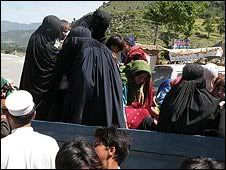
Civilians have been caught up in recent fighting in Dir
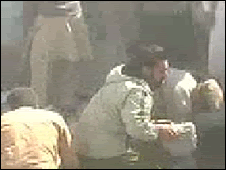
There are no signs the militant presence in Dir has been eradicated
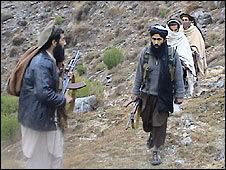
The Taliban are active in Lower Dir
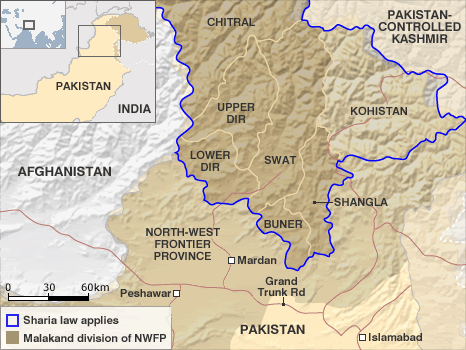
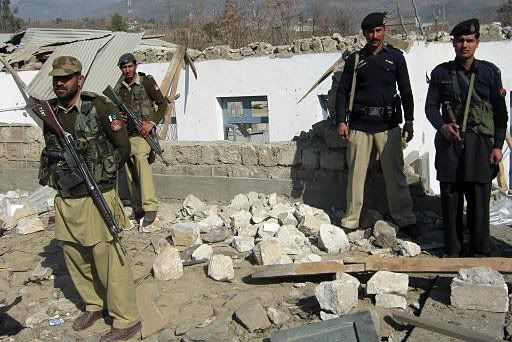
Soldiers at the site of a bomb blast
The deaths of at least 10 people - including three US soldiers - in the north-western Pakistani region of Dir has focused attention on a militant hotbed.
The area is home to conservative Pashtun tribes, where religious leaders wield considerable influence.
It is a place where women keep a low profile and where many are opposed to children being educated.
The clerics of Dir have traditionally opposed any activities by non-governmental organisations (NGOs) in the area, blaming them for encouraging mixed gatherings of men and women, which they consider unIslamic.
Ransacked
There is a long history of female NGO workers being harassed in this region.
When the Taliban consolidated their hold on Dir and nearby Swat during 2008 and 2009, their campaign against NGOs became more organised.
In early 2009, four Pakistani officials of the UN's World Food Programme (WFP) were kidnapped by Taliban. They were released after promising not to work for any local or foreign NGO.
Soon afterwards, a WFP food storage in the area was ransacked, putting an end to all NGO activity in Dir region.
The campaign against government schools, especially those for girls, has also been a main feature of this region.
The Taliban's opposition to female education led to arson and bomb attacks against schools in 2008 and throughout 2009.
According to the local administration, more than 72 schools have been bombed out or burned down by militants in Lower Dir district during the past two years.
The army launched an operation against militants in Lower Dir in April 2009 - forcing many civilians to leave the area - and declared victory less than a month afterwards.
Taliban model
But Wednesday's bomb attack shows how far from victory the army is.
It also emphasises how deeply conservative - some might say militant - the area is.
Since the 1970s the Jamaat-e-Islami religious party - which elsewhere in Pakistan has had a negligible influence on electoral politics - has had a secure constituency in the region.
In the 1980s, western parts of Dir district served as a staging ground for guerrilla fighters resisting Soviet troops in Afghanistan.
In 1994, Dir became the centre of a violent religious movement called the Tehrik Nifaz Shariat-e-Mohammadi or Movement for the Implementation of Sharia law.
The movement served as a model for the Afghan Taliban who emerged months later in southern Afghanistan.
The leader of the movement, Maulana Sufi Mohammad, is from the central Maidan area of Dir.
In October 2001, he led nearly 5,000 tribesmen from Dir and the adjacent Swat district into Afghanistan to fight the Americans, who were then preparing to attack the Taliban regime in Kabul.
By 2009, the Taliban from Swat started to assert their authority in the area - and there is no sign their presence has been eradicated.
A top US official said Wednesday three US military trainers killed in a bombing in Pakistan appear not to have been "directly targeted" and denied Taliban charges they worked for the controversial Blackwater security firm.
Their deaths and the wounding of two other US soldiers in the blast at a girls school is "a great tragedy," Richard Holbrooke, the special US representative for Afghanistan and Pakistan, told reporters in Washington.
He described them as "American military personnel in Pakistan who were doing training with the Frontier Corps," a Pakistani paramilitary force that patrols the borders.
Holbrooke said the US ambassador in Islamabad, Anne Patterson, whom he spoke with earlier, "does not think they were directly targeted. But that is my only source of information on that question."
He dismissed as propaganda allegations by the Taliban, which claimed responsibility for the attack, that the soldiers were actually employees of the private security firm formerly known as Blackwater Worldwide, which gained notoriety in Iraq.
"They're certain to say that," Holbrooke said of the Taliban allegations. "That's what they do. They are adept at propaganda and disinformation."
"But the facts are the facts and ...in the appropriate moment after notification of next of kin ... I'm sure their names and their exact rank will be publicly disclosed as we always do," the senior diplomat said.
"There's nothing secret about their presence there," he said.
Blackwater changed its name to Xe in February 2009 following what the company said was a switch in business focus.







0 comments:
Post a Comment